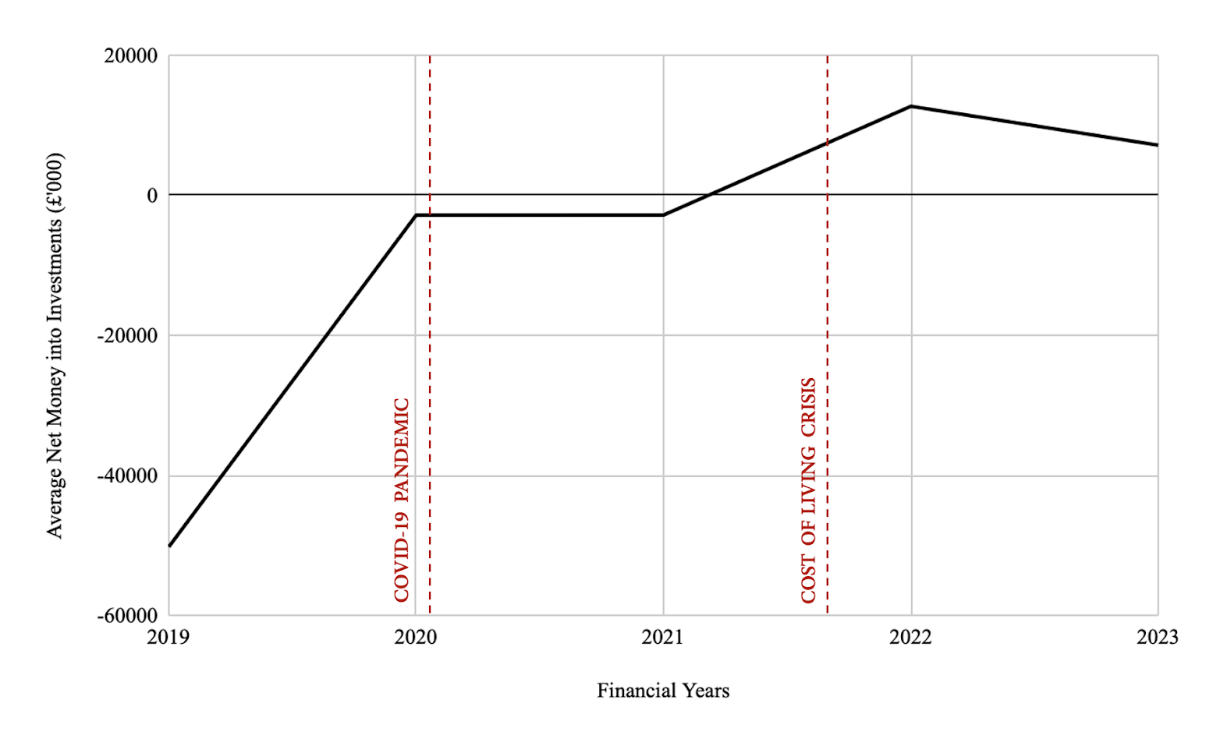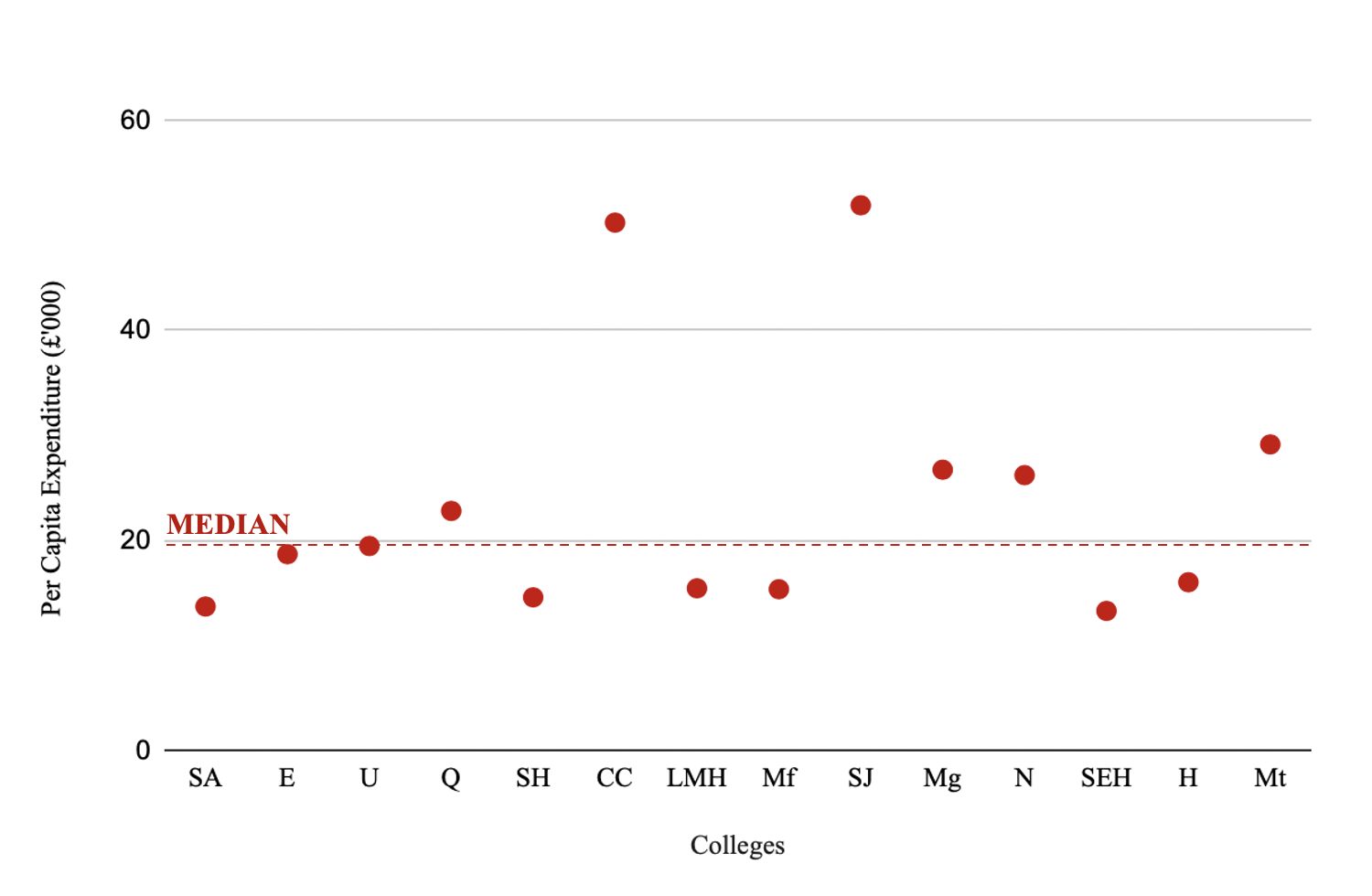In 2023, Oxford University’s 43 colleges boasted a total endowment of £6.4 billion. This figure is nearly four times as much as that of Oxford University itself and well over ten times larger than the endowment of all other UK universities, excluding the University of Cambridge. The sheer magnitude of Oxford’s collegiate wealth is no secret; yet the ways in which colleges use their extensive resources remain far less transparent.
While all colleges do put aside millions of pounds for student care, this is often only a fraction of their wealth (figure one). In investigating the financial patterns of 15 of Oxford’s richest and poorest colleges, Cherwell found that the vast majority of colleges’ endowments are far more inaccessible and inflexible than we might think.

College Disparities
An eighth of the wealth of all Oxford colleges is held by St John’s College alone, bringing its current value to £790 million, well over 20 times the size of some of Oxford’s least wealthy colleges. This inconsistency is a familiar issue to all Oxford students; college disparities have long been a discussion of national debate, student union campaigns, and Cherwell reports.
Yet it is perhaps surprising that these gaping disparities in resources have a relatively low direct financial impact on students. Indeed, a college’s endowment does not predict spending on students. Colleges spend enough money to cover student-related costs: staff wages, subsidising the tutorial system, rent and accommodation, and more. But once they have spent enough to allow their collegiate functions, they are left with large sums of money students never see.
Each Oxford college’s spending on their charitable aims, namely education, varies little. Apart from All Soul’s College, whose ten students naturally generate a very high per capita expenditure, in 2023 St John’s College spent the most per student at £51,000. This contrasts the lowest expense of £13,300 per capita at St Edmund Hall.
Yet the majority of colleges do spend roughly the same amount (graph one). The median amount spent on students in 2023 sits at £19,500, the expenditure of University College. Therefore student spending between wealthier and poorer colleges remains largely the same and nearly all colleges cap student expenditure at roughly the same point.
While some of the richer colleges, such as Christ Church College and St John’s College, do allocate larger amounts of funds for their students than others – both spent around £34 million in 2023 – this is still not proportional to their endowment. This £34 million expenditure, for example, only accounts for approximately 4% of the total endowment held by these colleges.
Indeed, most of the time student expenditure is only a small chunk of a college’s wealth (figure one) and on average over the last five years, the amount colleges have spent on their students has been 6% of their overall endowment.
Furthermore in 2023, The Queen’s College spent £22,800 per student, only 1.5 times more than the £16,000 spent per student by Hertford College, despite the fact that The Queen’s College endowment is five times larger.
These figures suggest that a college’s endowment is not proportional to how much money students actually receive. In fact, when colleges only spend small fractions of their funds on students, the vast majority of their endowment wealth has little interaction with their students at all.

Inflexible endowments
The fact that Oxford colleges spend only small fractions of their endowments on their students is not in itself a negative thing. However, analysing the expenditure patterns of 15 colleges over the last five years exposes some problems. Since 2019, there have been two significant times of need – the COVID-19 pandemic of early 2020 and the cost of living crisis of late 2021. During both crises, students were under more financial and academic stress and thus, in need of more economic support. Yet in 2020, the average amount colleges spent on their students fell.
When asked if St Anne’s College felt times of crisis should mean increasing expenditure on students, Treasurer and Finance Director, John Ford, agreed telling Cherwell: “Yes. And we saw that during COVID.” Yet in 2020, St Anne’s College decreased student expenditure from £11.5 million in 2019 to £9.6 million in 2020.
Moreover, Iris Burke, Bursary Manager at St John’s College told Cherwell that during the pandemic the College “minimised increases to student rents and charges and absorbed much of the inflationary pressures” in order to financially support their students at the time. However, students told Cherwell they were “charged the full rent amount each term, despite limited access to [shared] facilities.” Students further described a time “when we were told on more than one occasion, bluntly, that the college would not be considering any rent reduction.”
While St John’s College provided additional funding “in the form of higher academic grants”, students overall expressed how they felt “as though the College was apathetic towards our concerns, with more effort placed in ensuring it maintained the income it would otherwise have collected from the student body wherever possible.”
Increasing investment
Not only did colleges not increase their spending on students during times of economic difficulty, such as the pandemic and cost of living crisis, but they also chose to increase the amount of money they put into investments. In addition to decreasing student expenditure, for example, St Anne’s College put an additional £1.7 million of new money into their ‘other investments’ in 2020.
As a whole, since 2019 the average net amount of money put into ‘other investments’ by 15 colleges according to their last five Charity Commission annual reports has increased (graph two). A college’s ‘other investments’ refers to investments that are usually part of their endowment. Colleges also invest in ‘property investments’ and ‘parent and subsidiary undertakings’, yet these might not always form a part of their endowment.
Although money put into ‘other investments’ plateaued between 2020 and 2021, it was still an increase from the previous financial year of 2019 and it went on to rise again after. These investment behaviours and patterns of colleges are not reflective of the times when students needed more financial support and help.

Why colleges can’t spend more
Investment is an integral way that Oxford colleges use their endowment to generate a return that can be used to fund their charitable objectives, namely education, in the long term. But this focus on future maintenance and growth must be balanced with the immediate funding and care given to colleges and their current students. Ford explained the importance of achieving this balance to Cherwell, saying “we cannot put all our income into investments, there would be nothing to fund current expenditure, similarly some funding needs may be short term and funded through current income.”
However, this balance seems to have become skewed with investment being prioritised over students and most of the endowment being inaccessible to students. The large sums of money left unspent in endowments are an unavoidable consequence of the system as a whole. Contrary to how it may seem, endowments are not accessible pots of money that colleges can hand out to their students.
As charities with permanent endowments, colleges are obligated by Charity Commission regulation to “keep rather than spend” this endowment. This helps to maintain colleges in the long-term, allowing them to ensure care for future students; it is by no means an inherently flawed policy.
However, colleges have increasingly adopted protective financial policies that, for better or worse, place the possible needs of future students above the real needs of current ones. The handling of endowments does not prioritise student cost, and in many ways is entirely unrelated to and detached from current student life.
The conservative financial approach also establishes an inevitable level of inflexibility. Colleges adhere to different investment policies to help them maintain and grow their endowment. University College, for example, chooses a policy whereby they withdraw 3.5% of the average real value of their endowment over the last three years. This proportion does, and did not, change, regardless of the performance of their investments or current student needs.
While they aim to strike a balance between spending for the students of the present and the students of the years to come, colleges favour funding the future as a result of inflexible investment policies. Their increasing prioritisation of investments to accumulate and preserve their endowments is more reminiscent of businesses with colleges attached rather than institutions of learning. Although this allows colleges and the University of Oxford as a whole to prosper and survive, it neglects those currently within its walls.
Transparency
It is also important to mention the lack of transparency surrounding college endowments. Although all colleges submit financial reports to the UK government’s Charity Commission, these often remain vague, especially for those without accounting literacy. Furthermore, they often explain large sums of money with ambiguous terms. In their 2023 annual finance report, for example, Magdalen College lists £6.5 million of its ‘Property Investments’ under the vague umbrella label “other”.
Even at a more direct level, college expenditure is not made clear or properly communicated. A JCR Treasurer told Cherwell: “The College is transparent to the extent required by law, but they fail to take a proactive approach to ensure students are aware of its expenditure…This means that the formal transparency does not necessarily translate into effective scrutiny by its members.”
Where does the money go?
The endowment is seen as an Oxford college’s greatest asset: a vast amount of money they can use to achieve their charitable aims and serve their students. Yet in reality, their inaccessibility and inflexibility means they are, by nature, almost entirely detached from student life. The constant focus on the future means these endowments are never truly used to their fullest capability. Student expenditure is confined to only a fraction of a college’s overall wealth and colleges are rendered unable to freely respond to external issues, such as financial crises. Endowments are paralysed and inaccessible funds, both for future students as well as past.
St Anne’s College said in response: “The Covid outbreak occurred in March 2020 affecting four months of college activity. We had very few students in college accommodation, very little on site activity, very low utility bills and, perhaps coincidentally in those numbers, a £924k reduction in our pension provision. Income also fell by around £1.9M The £1.7M related to cash already set aside to repay capital on a loan and was quite separate. The loan was taken out to improve student accommodation. Student accommodation is subsidised and rents alone will not be sufficient to repay the capital, we therefore set up a sinking fund to help repay it. During Covid both the colleges and university dramatically stepped up their hardship support for students. This continued for several years after 2020.
“I think it is important to emphasise that spending on expenditure today, and investing today for expenditure tomorrow are essentially the same thing. Any investments we make are to create income for future student and teaching support. We are an educational charity not a fund management operation. Our endowment and investments are also some of the lowest amongst Oxford colleges.”
Christ Church College said in response: “Christ Church relies as to 54% of its income on the annual ‘take’ from the endowment. This is calculated as 3.25% of the 5-year historic average value of the endowment. We believe that this spending rule represents an appropriate forecast of the excess endowment return over inflation which we can expect over the medium term, so that we will maintain the purchasing power of the endowment. This will support our ability to maintain the wide range of activities which Christ Church undertakes including of course significant support for its students.”
St John’s College said in response: “The College’s endowment is used for both revenue and investments in capital projects in order to improve facilities and enhance the student experience. We have a significant capital programme underway to provide more graduate accommodation and to refurbish existing accommodation for undergraduates and postgraduates. In recent years returns of the endowment were used to fund the new Study Centre and refurbish the existing Library, which students derive direct benefit from.
“The College only charged rent to those students that remained in College during the Covid lockdowns. We also provided grants to those students that needed support with accommodation and food costs if they were in residence at the time.”










